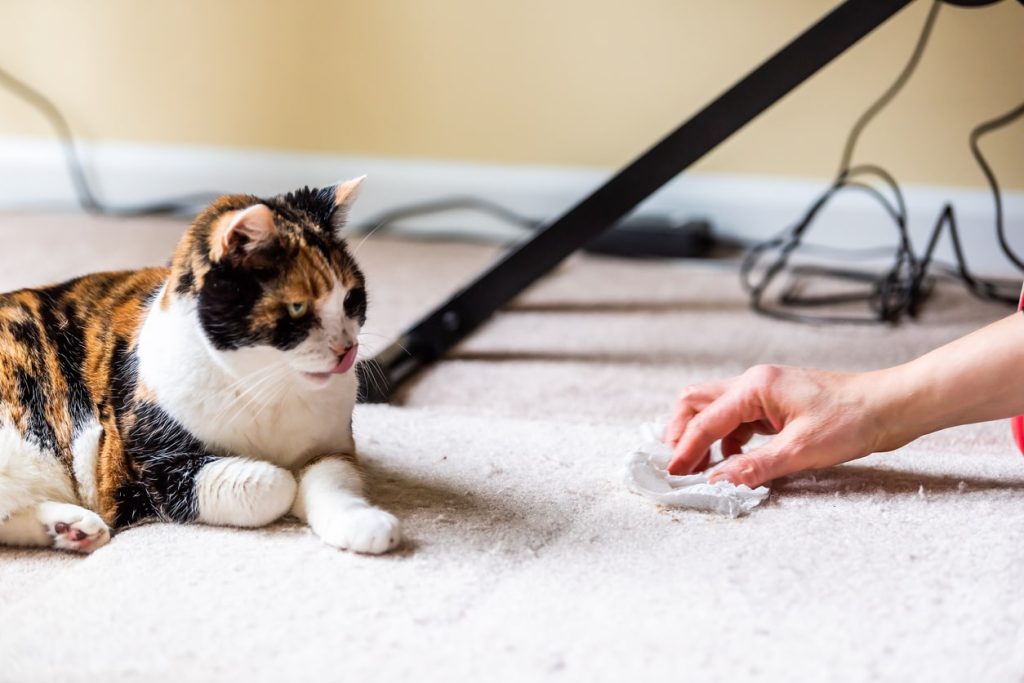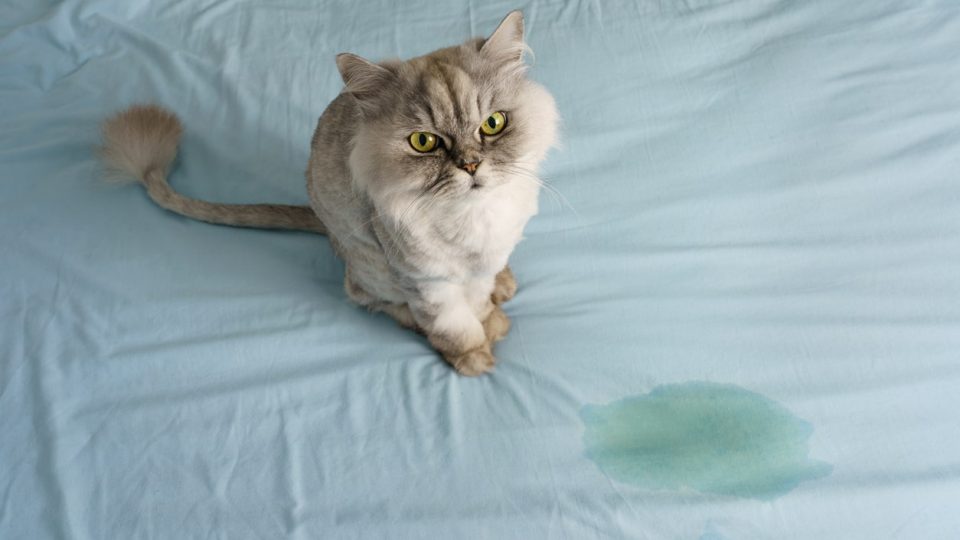- Not a substitute for professional veterinary help.
Spraying, or urine marking, is a natural behavior for cats, especially unneutered males. However female cats spray too! Many unspayed female cats start spraying when they reach sexual maturity at around 6 months old. However, even a healthy spayed female cat might begin spraying at any age if she suddenly feels insecure or threatened.
We spoke to veterinarians to get more details on about why female cats spray and how to manage this behavior for our furniture and mental health’s sake.
Reasons Female Cats Spray
Indoor female cats spray in the house for biological or behavioral reasons, says Dr. Preston Turano, DVM, a veterinary advisor for Felix Cat Insurance.
1. They’re in heat
Sexually mature female cats spray when they’re in heat to attract a mate. This natural behavior often leaves very smelly urine due to additional fluids, like secretions from anal glands and pheromones, explains Stephen Quandt, a cat behaviorist and founder of Feline Behavior Associates.
2. They’re resource guarding
Spraying helps cats release their frustration and communicate, especially if they don’t get along with other cats at home, says Heather Alvey, a certified cat behavior consultant and owner of Felidae Behavior Consulting.
In multi-cat households, it’s essential to provide enough resources like food and water bowls, scratching posts, and litter boxes. Cats prefer not to share and may become aggressive if they feel another cat is using something they consider theirs, like a favorite litter box. This possessiveness can lead to spraying on walls or furniture near the resource.
3. They’re warning other cats
If a female cat that usually gets along with others suddenly starts spraying, it can be confusing. However, even indoor cats can feel protective of their territory. Stray or feral cats outside, especially if they use your garden as a litter box, can trigger a female cat’s territorial instincts.
In this case, she may spray to warn other cats that the area is hers. Dr. Woodnutt explains that spraying near doors or windows where she can see the trespassing cats points to this behavior.
4. They’re anxious or stressed
Despite their calm demeanor, cats are sensitive animals that can easily become anxious. Changes in their environment, such as a new roommate, baby, or kitten, can be stressful. Even common disturbances like construction noise or home renovations can trigger anxiety in a female cat.
Quandt suggests that providing more enrichment—such as food puzzles, daily play, clicker training, and maintaining a consistent routine—can help reduce anxiety, improve her quality of life, and possibly stop spraying.
Female Cats Commonly Spray These Areas
Dr. Woodnutt says female cats tend to spray in specific areas that are important to their territory, such as:
- Walls at the edges of a room
- Furniture and plants near doors
- Doorways
- Cat flaps inside the house or leading outside
- Areas close to their sleeping spots
Also, spraying isn’t usually a one-time event; it often becomes a repeated behavior.
“They tend to return to the same place to spray again and again, marking the territory as theirs,” Dr. Woodnutt says.
Is My Cat Spraying or Peeing?
The amount of urine is a clear sign your cat is spraying instead of peeing. “They typically back up to a vertical surface with a raised, often quivering tail and direct a horizontal stream against the wall or surface,” Quandt says about spraying. “They don’t empty their bladders, just release a small amount of urine.”
You might also notice your cat sniffing the area intently and rubbing her body against it.
It’s important to note that spraying is not the same as avoiding the litter box, inappropriate elimination, or a sign of a medical issue.
How to Stop Female Cat Spraying
If your female cat is spraying, ignoring it won’t help; she won’t stop on her own.
“Identifying and addressing the root cause is key. Observing where the spraying happens can provide valuable clues,” Alvey says.
1. Spay your cat
If you’re not planning to breed your cat, spaying is recommended. This can help stop spraying and also control the cat overpopulation. Dr. Turano says spaying has health benefits, like reducing the risk of certain cancers and uterine infections, including the painful and potentially fatal pyometra.
Cats can be safely spayed or neutered once they reach two pounds, so there’s no need to wait until they have their first heat cycle.
2. Rule out any medical conditions
Take your cat to the vet to check for health issues, like urinary incontinence, bladder infections, Feline Lower Urinary Tract Disease (FLUTD), or kidney disease.
Unlike spraying, these medical issues make cats fully pee right outside the litter box. Quandt mentions that signs of urinary problems can include urethra staining, difficulty squatting, and a lack of awareness that they’re peeing (especially in bed).
3. Check your cat’s environment
Consider your cat’s surroundings inside and outside the home. Is there only one litter box for multiple cats? Has a new cat been roaming outside near your windows?
Changes like new people or pets in the home or construction noise can also trigger spraying. If outdoor cats are the issue, a feline behaviorist or vet can suggest humane ways to deter them.
For indoor issues, try adding resources like extra litter boxes, creating a consistent routine, providing more mental stimulation, or consulting a vet about short-term anti-anxiety medications.
4. Redirect, don’t punish
Alvey says spraying is a natural way cats deal with stress. “Yelling at and punishing your cat will only increase the stress, making the problem worse and damaging your relationship,” she adds.
If you see your cat about to spray, try gently calling her over. If she disengages, redirect her to a toy that encourages active play, like a wand toy or laser pointer.
5. Set up a spray zone
For a temporary solution, Alvey says you can tape absorbent pads on the areas where your cat tends to spray.
While it’s essential to address the underlying cause, this can help keep surfaces cleaner and reduce odors in the meantime.
6. Get help from a behavioral expert
A feline behaviorist can provide customized strategies to help stop your cat’s spraying. Many behaviorists offer initial consultations or virtual meetings to see if they’re a good fit for your situation.
Their expertise can provide valuable insights and make it easier for you to manage the issue confidently.

iStock/krblokhin
Cat Spraying FAQs
Can spayed female cats still spray?
Yes, spayed female cats can spray, but Dr. Turano says it’s rare—occurring in less than 5% of spayed cats.
When they do spray, it usually indicates a behavioral issue or a way of expressing their distress.
Does spraying mean my cat is unhappy?
Unless you have an unspayed female cat in heat, spraying often suggests that a cat is unhappy, stressed, or frustrated.
This behavior may stem from deeper issues, such as sudden changes in the household, free-roaming cats outside, insufficient mental and social enrichment, or conflicts with other cats in a multi-cat home.
Can multiple cats in a household cause spraying?
Yes, spayed female cats might start spraying if there’s conflict among multiple cats. Issues like cat-on-cat aggression or competition for valuable resources, such as litter boxes (especially if there aren’t enough), can trigger territorial responses that lead to spraying.



